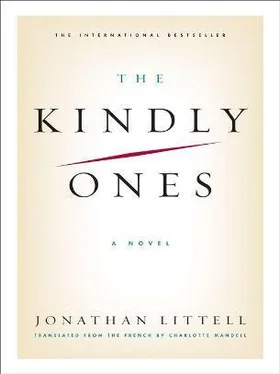Jonathan Littell - The Kindly Ones
Здесь есть возможность читать онлайн «Jonathan Littell - The Kindly Ones» весь текст электронной книги совершенно бесплатно (целиком полную версию без сокращений). В некоторых случаях можно слушать аудио, скачать через торрент в формате fb2 и присутствует краткое содержание. Год выпуска: 2009, ISBN: 2009, Издательство: HarperCollins e-books, Жанр: Историческая проза, на английском языке. Описание произведения, (предисловие) а так же отзывы посетителей доступны на портале библиотеки ЛибКат.
- Название:The Kindly Ones
- Автор:
- Издательство:HarperCollins e-books
- Жанр:
- Год:2009
- ISBN:978-0-06-177548-2
- Рейтинг книги:4 / 5. Голосов: 1
-
Избранное:Добавить в избранное
- Отзывы:
-
Ваша оценка:
- 80
- 1
- 2
- 3
- 4
- 5
The Kindly Ones: краткое содержание, описание и аннотация
Предлагаем к чтению аннотацию, описание, краткое содержание или предисловие (зависит от того, что написал сам автор книги «The Kindly Ones»). Если вы не нашли необходимую информацию о книге — напишите в комментариях, мы постараемся отыскать её.
The Kindly Ones The Kindly Ones Massive in scope, horrific in subject matter, and shocking in its protagonist, Littell's masterpiece is intense, hallucinatory, and utterly original. Critics abroad have compared this provocative and controversial work of literature to Tolstoy's War and Peace, a classic epic of war that, like The Kindly Ones, is a morally challenging read.
The Kindly Ones — читать онлайн бесплатно полную книгу (весь текст) целиком
Ниже представлен текст книги, разбитый по страницам. Система сохранения места последней прочитанной страницы, позволяет с удобством читать онлайн бесплатно книгу «The Kindly Ones», без необходимости каждый раз заново искать на чём Вы остановились. Поставьте закладку, и сможете в любой момент перейти на страницу, на которой закончили чтение.
Интервал:
Закладка:
There was a lot of talk, after the war, in trying to explain what had happened, about inhumanity. But I am sorry, there is no such thing as inhumanity. There is only humanity and more humanity: and that Döll is a good example. What else was he, Döll, but a good family man who wanted to feed his children, and who obeyed his government, even though in his innermost being he didn’t entirely agree? If he had been born in France or America, he’d have been called a pillar of society and a patriot; but he was born in Germany, and so he is a criminal. Necessity, as the Greeks knew already, is not only a blind goddess, but a cruel one too. Not that there was any lack of criminals, at the time. All of Lublin, as I’ve tried to show, was steeped in a sleazy atmosphere of corruption and excess; the Einsatz, but also colonization and exploitation of that isolated region, made more than one person lose his head. Since my friend Voss’s remarks about this, I have thought about the difference between German colonialism, as it was practiced in the East during those years, and the colonialism of the British and the French, in principle more civilized. There are, as Voss stressed, objective facts: after the loss of its colonies in 1919, Germany had to recall its cadres and close its colonial administration offices; the training institutes remained open in principle, but didn’t attract anyone, because of the lack of prospects; twenty years later, a whole specialized field of knowledge had been lost. That being the case, National Socialism had given impetus to an entire generation, full of new ideas and greedy for new experiences, which, as regards colonization, were perhaps just as valid as the old ones. As for the excesses—the aberrant outbursts like those you could see in the Deutsches Haus or, more systematically, the seeming incapability of our administrators to treat the colonized peoples, some of whom would have been ready to serve us willingly if we had left the door open, other than with violence and contempt—one shouldn’t forget, either, that our colonialism, even in Africa, was a young phenomenon, and that the others, in the beginning, scarcely did any better: just consider the Belgian exterminations in the Congo, and their policy of systematic mutilation, or else the American policy, precursor of and model for our own, of the creation of living space through murder and forced displacement—America, we tend to forget, was anything but a “virgin territory,” but the Americans succeeded where we failed, which makes all the difference. Even the British, so often cited as an example, and whom Voss so admired, needed the trauma of 1858 to begin to develop more sophisticated tools of control; and if, little by little, they learned to play a virtuoso game of carrot-and-stick, we shouldn’t forget that the stick was far from neglected, as one can see from the Amritsar Massacre, the bombing of Kabul, and other examples, many and forgotten.
But now I’ve strayed from my first reflections. What I wanted to say is that if man is certainly not, as some poets and philosophers have made him out to be, naturally good, he is not naturally evil, either: good and evil are categories that can serve to qualify the effect of the actions of one man on another; but they are, in my opinion, fundamentally unsuitable, even unusable, to judge what goes on in the heart of that man. Döll killed people or had them killed, so he’s Evil; but within himself, he was a good man to those close to him, indifferent to all others, and, what’s more, one who respected the law. What more do we ask of the individual in our civilized, democratic cities? And how many philanthropists, throughout the world, made famous by their extravagant generosity are, on the contrary, monsters of egotism and harshness, greedy for public glory, full of vanity, tyrannical toward those close to them? Every man wants to satisfy his own needs and remains indifferent to the needs of others. And in order for men to be able to live together, avoiding the Hobbesian state of “all against all,” and, on the contrary, to be able, thanks to mutual aid and the increased productivity that stems from it, to satisfy a greater portion of their desires, you need a regulatory authority, which prescribes limits to these desires and arbitrates conflicts: this mechanism is the Law. But it is also necessary for men, egotistical and weak, to accept the constraint of the Law, and so this Law must refer to an authority outside of man, must be founded on a power that man feels is superior to himself. As I had suggested to Eichmann during our dinner, this supreme and imaginary reference point was for a long time the idea of God; from that invisible, omnipotent God, it shifted to the physical presence of the king, sovereign by divine right; and when that king lost his head, sovereignty passed to the People or to the Nation, and was based on a fictive “contract,” without any historical or biological foundation, and thus just as abstract as the idea of God. German National Socialism sought to anchor it in the Volk , a historical reality: the Volk is sovereign, and the Führer expresses or represents or embodies this sovereignty. From this sovereignty the Law is derived, and for most men, in all countries, morality is nothing but Law: in this sense, Kantian moral law, with which Eichmann was so preoccupied, stemming from reason and identical for all men, is a fiction like all laws (but perhaps a useful fiction). Biblical Law says, Thou shalt not kill, and doesn’t brook any exception; but every Jew or Christian accepts that in wartime that law is suspended, that it is just to kill the enemy of one’s people, that there is no sin in that; once the war is over and the weapons stored away, the old law resumes its peaceful course, as if the interruption had never taken place. So for a German, to be a good German means to obey the laws and thus the Führer: there can be no other morality, since there would be nothing to support it. (And it’s not by chance that the rare opponents of our power were for the most part believers: they preserved another moral reference point, they could judge Good and Evil on another basis than the will of the Führer, and God served them as a fulcrum to betray their leader and their country: without God, that would have been impossible for them, since where could they have found a justification? What man alone, of his own free will, can come to a decision and say, This is good, that is evil? How outrageous that would be, and how chaotic too, if everyone dared to act that way: if every man lived according to his private Law, Kantian as it might be, we’d be back with Hobbes again.) So if you wish to judge German actions during this war as criminal, it’s all of Germany you have to call to account, not just the Dölls. If Döll and not his neighbor ended up in Sobibor, that’s chance, and Döll is no more responsible for Sobibor than his luckier neighbor; at the same time, his neighbor is just as responsible as he is for Sobibor, since both served the same country with integrity and devotion, the country that created Sobibor. When a soldier is sent to the front, he doesn’t protest; not only is he risking his life, but he is forced to kill, even if he doesn’t want to kill; his free will abdicates; if he remains at his post, he’s a virtuous man, if he runs away, he’s a deserter, a traitor. The man posted to a concentration camp, like the man assigned to an Einsatzkommando or a police battalion, most of the time doesn’t reason any differently: he knows that his free will has nothing to do with it, and that chance alone makes him a killer rather than a hero, or a dead man. Otherwise, you would have to consider these things from a moral standpoint not Judeo-Christian (or secular and democratic, which amounts to exactly the same thing) but rather Greek: for the Greeks, chance played a part in the doings of men (chance, it should be said, often disguised as an intervention of the gods), but they did not consider that this chance diminished one’s responsibility in any way. Crime has to do with the deed, not the will. When Oedipus kills his father, he doesn’t know he is committing parricide; killing a stranger who has insulted you on the open road, for Greek conscience and law, is a legitimate action, there’s no sin in it; but that man was Laius, and ignorance doesn’t alter the crime in the least: and Oedipus himself recognizes this, and when he finally learns the truth, he chooses his own punishment, and inflicts it on himself. The link between will and crime is a Christian notion, which persists in modern law; the penal code, for example, regards involuntary or negligent homicide as a crime, but a lesser one than premeditated homicide; the same is true for the legal concept of diminished responsibility in case of insanity; and the nineteenth century ended by linking the notion of crime to that of the abnormal. For the Greeks, it doesn’t matter whether Heracles kills his children in a fit of madness, or if Oedipus kills his father by accident: that changes nothing, it’s a crime, they are guilty; you can pity them, but you can’t absolve them—and that is true even if often their punishment is left to the gods, and not to men. From this perspective, the principle of the postwar trials, which tried men for their concrete actions, without taking chance into account, was just; but they went about it clumsily; tried by foreigners whose values they denied (while still acknowledging their rights as the victors), the Germans could feel they had been relieved of this burden, and were hence innocent: since the person who wasn’t tried regarded the one who was as a victim of bad luck, he absolved him, and at the same time absolved himself; and the man rotting in a British jail, or a Russian gulag, did the same. But could it have been otherwise? How, for an ordinary man, can something be righteous one day and a crime the next? Men need to be guided, it’s not their fault. These are complex questions and there are no simple answers. Who knows where the Law is? Everyone must look for it, but it’s difficult, and it’s normal to bow to the common consensus. Everybody can’t be a legislator. It’s no doubt my meeting with a judge that made me think about all that.
Читать дальшеИнтервал:
Закладка:
Похожие книги на «The Kindly Ones»
Представляем Вашему вниманию похожие книги на «The Kindly Ones» списком для выбора. Мы отобрали схожую по названию и смыслу литературу в надежде предоставить читателям больше вариантов отыскать новые, интересные, ещё непрочитанные произведения.
Обсуждение, отзывы о книге «The Kindly Ones» и просто собственные мнения читателей. Оставьте ваши комментарии, напишите, что Вы думаете о произведении, его смысле или главных героях. Укажите что конкретно понравилось, а что нет, и почему Вы так считаете.










